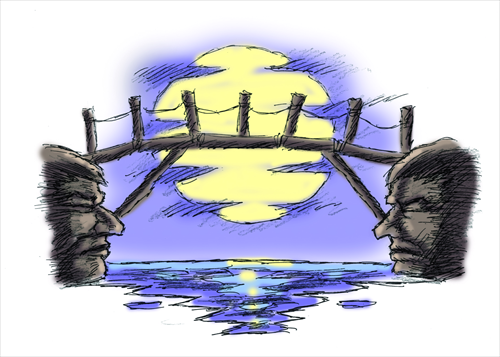Central Asia in uncertain transition

Illustration: Peter C. Espina/GT
Editor's Note:
While China deepens its ties with Central Asian countries and seeks new breakthroughs, the region is faced with political risks from within and threats from outside. As competition between world powers in this region grows fiercer, regional cooperation mechanisms can play an essential role. At the third Central Asia Forum held by the Institute of Russian, East European and Central Asian Studies of the Chinese Academy of Social Sciences recently, experts from China and Central Asia shared their views on issues that urgently need to be tackled in the region.
Muratbek Imanaliyev, former general secretary of the Shanghai Cooperation Organization
Central Asian countries are in a stage of transition, and have to evaluate their own capabilities to push themselves forward.
Currently, Central Asian countries are not able to fully develop ties with each other under the framework of international law. For example, water disputes among them remain tense.
But the negotiation process has yet to start, let alone achieve any substantial results.
Meanwhile, there is no way at present that Central Asian countries can establish a collective security mechanism under which they can face all kinds of challenges and threats.
Konstantin Syroezhkin, research fellow at the Kazakhstan Institute for Strategic Studies
I'd like to talk about the policies adopted by the US, Russia and China in the Central Asia region.
The US has taken a double standard in regional security restructuring, as it has done in many other countries. For example, if it cannot realize its goal of building up democracy, it would rather drop bombs. Regrettably, some Central Asian countries support such US standards.
Russia does not have a certain policy in Central Asia. Its policies are just like trading with the region like doing business or socializing, far from real politics. Therefore, it seems we do not share a common developing will with Russia.
When we talk about the integration of Eurasia that Russia advocates, we find that we actually know little about it. What can Kazakhstan, Tajikistan or Kyrgyzstan get from it?
China's rapid development and consolidation of status in Central Asia have sounded the alarm bell, not only from the West and Russia but also from Central Asia itself.
But we need to understand more about China's policies too. Take the economy. We welcome Chinese President Xi Jinping's visits to our countries. But as for the silk road economic belt, a notion raised by top Chinese leadership, is it simply a free trade area under the framework of the SCO?
Clearer understandings need to be introduced as China and Central Asian countries are seeking to further cooperation.
Xu Tao, research fellow at the Institute of Russian Studies of the China Institutes of Contemporary International Relations
The security issue is an old one for Central Asia. But there are some new elements.
First, regional extremism hasn't been curbed effectively. At this year's SCO summit, Kyrgyz President Almazbek Atambayev pointed out that Central Asia is facing a severe situation.
According to Kyrgyz media, a terrorist group was arrested after the summit, including Kyrgyz citizens and jihadists from Middle East.
The group was apparently targeting the presidential elections in Tajikistan in November.
Many Central Asian countries such as Tajikistan, Kazakhstan and Uzbekistan are about to go through power transitions. Leaders in these countries have been holding onto the reins for a long time, and this process will come sooner or later.
But the process remains somewhat opaque and generates much speculation outside the region.
The regional countries have not developed mature ties with each other, economically or geopolitically. Water, energy channels and trans-border ethnic issues are concrete problems.
Once an emergency occurs, any kind of nationalism can create waves by seeking these chances. This is a risk that tests future security in Central Asia.